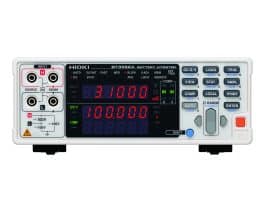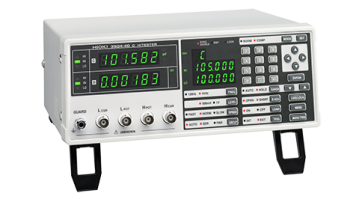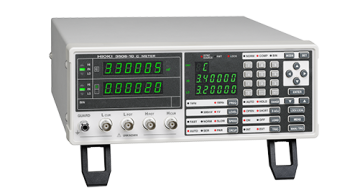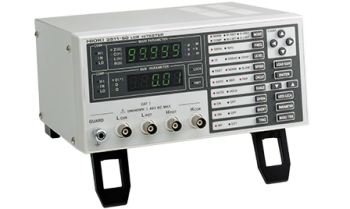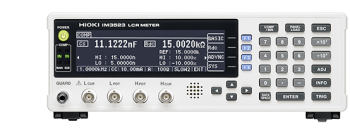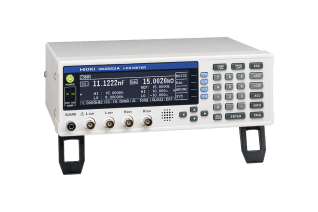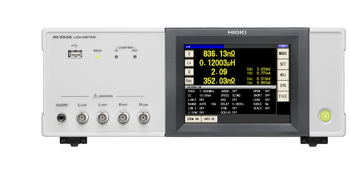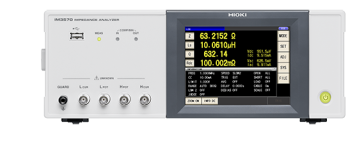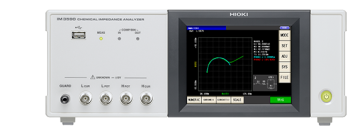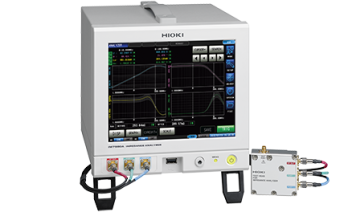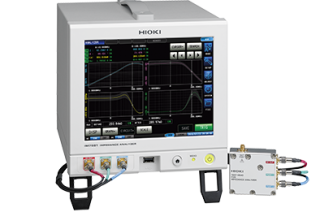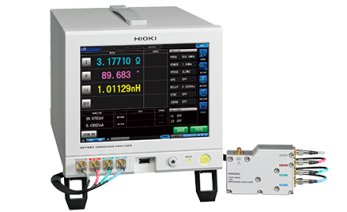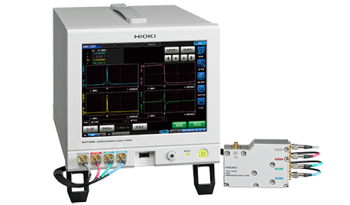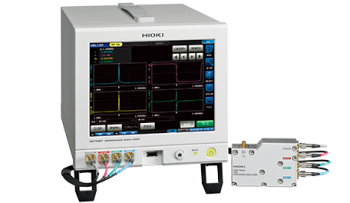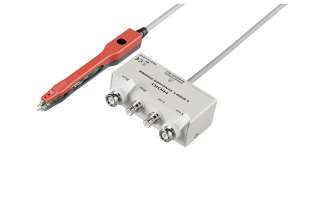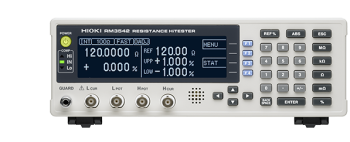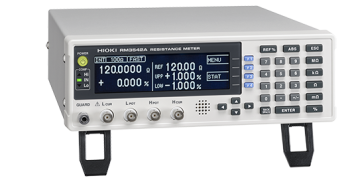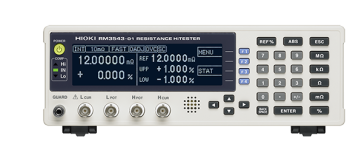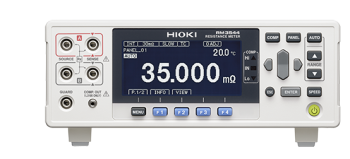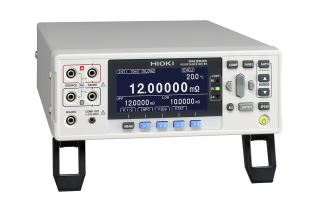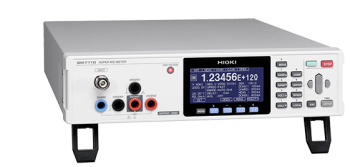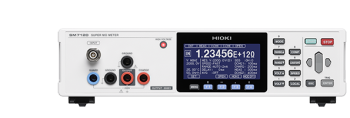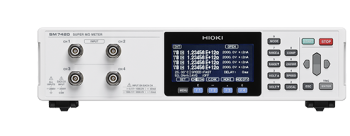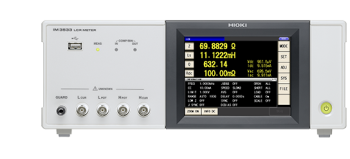Power Electronics Test Systems /
Impedance Analyzers / LCR Meters
Impedance analyzers, also known as LCR (inductance, capacitance, and resistance) meters, are sophisticated electronic devices that measure the electrical impedance of electronic components, such as capacitors, inductors, and resistors. These meters can measure a wide range of parameters including capacitance, inductance, resistance, dissipation factor, quality factor, and phase angle.
The primary function of an impedance analyzer is to provide precise and accurate measurements of the electrical characteristics of components, which can be used for design, testing, and quality control purposes. Impedance analyzers are commonly used in a variety of industries such as electronics, telecommunications, medical devices, and automotive engineering.
LCR meters work by applying a known voltage or current to a component and measuring the resulting current or voltage. The impedance of the component is then calculated using Ohm's law. The analyzer can be used to test a variety of components, including passive components, active components, and circuits.
One of the key advantages of impedance analyzers is their ability to measure impedance across a wide range of frequencies. This is important because the electrical properties of components can vary significantly at different frequencies. Impedance analyzers can measure impedance at frequencies ranging from a few Hertz to several Gigahertz.
Impedance analyzers are available in various configurations, including benchtop, portable, and handheld models. Benchtop models are typically more accurate and have a wider range of features, while portable and handheld models are more convenient for field applications.
Impedance analyzers, also known as LCR (inductance, capacitance, and resistance) meters, are sophisticated electronic devices that measure the electrical impedance of electronic components, such as capacitors, inductors, and resistors. These…
...meters can measure a wide range of parameters including capacitance, inductance, resistance, dissipation factor, quality factor, and phase angle.
The primary function of an impedance analyzer is to provide precise and accurate measurements of the electrical characteristics of components, which can be used for design, testing, and quality control purposes. Impedance analyzers are commonly used in a variety of industries such as electronics, telecommunications, medical devices, and automotive engineering.
LCR meters work by applying a known voltage or current to a component and measuring the resulting current or voltage. The impedance of the component is then calculated using Ohm’s law. The analyzer can be used to test a variety of components, including passive components, active components, and circuits.
One of the key advantages of impedance analyzers is their ability to measure impedance across a wide range of frequencies. This is important because the electrical properties of components can vary significantly at different frequencies. Impedance analyzers can measure impedance at frequencies ranging from a few Hertz to several Gigahertz.
Impedance analyzers are available in various configurations, including benchtop, portable, and handheld models. Benchtop models are typically more accurate and have a wider range of features, while portable and handheld models are more convenient for field applications.
-
Measuring battery performance and safety using internal resistance (AC-IR) and open-circuit voltage (OCV) Hioki BT3562A Battery HiTester –...FIND OUT MORE
-
Hioki LCR Meters and Impedance Analyzers range from 1mHz to 3GHz devices to suit a wide range of applications in the testing of electronic...FIND OUT MORE
-
Hioki LCR Meters and Impedance Analyzers range from 1mHz to 3GHz devices to suit a wide range of applications in the testing of electronic...FIND OUT MORE
-
Hioki LCR Meters and Impedance Analyzers range from 1mHz to 3GHz devices to suit a wide range of applications in the testing of electronic...FIND OUT MORE
-
Hioki LCR Meters and Impedance Analyzers range from 1mHz to 3GHz devices to suit a wide range of applications in the testing of electronic...FIND OUT MORE
-
The Hioki LCR Meter IM3523A is a cost-effective and high-performing device designed for basic measurement on production lines. With a high basic...FIND OUT MORE
-
The Hioki LCR Meters and Impedance Analyzers encompass a comprehensive collection of devices that cater to a diverse array of applications in...FIND OUT MORE
-
Hioki LCR Meters and Impedance Analyzers range from 1mHz to 3GHz devices to suit a wide range of applications in the testing of electronic...FIND OUT MORE
-
Hioki LCR Meters and Impedance Analyzers range from 1mHz to 3GHz devices to suit a wide range of applications in the testing of electronic...FIND OUT MORE
-
Hioki LCR Meters and Impedance Analyzers range from 1mHz to 3GHz devices to suit a wide range of applications in the testing of electronic...FIND OUT MORE
-
Hioki LCR Meters and Impedance Analyzers range from 1mHz to 3GHz devices to suit a wide range of applications in the testing of electronic...FIND OUT MORE
-
Hioki LCR Meters and Impedance Analyzers range from 1mHz to 3GHz devices to suit a wide range of applications in the testing of electronic...FIND OUT MORE
-
Hioki LCR Meters and Impedance Analyzers range from 1mHz to 3GHz devices to suit a wide range of applications in the testing of electronic...FIND OUT MORE
-
Hioki LCR Meters and Impedance Analyzers range from 1mHz to 3GHz devices to suit a wide range of applications in the testing of electronic...FIND OUT MORE
-
Introducing the L2001 Pincher Probe – the ultimate tool for measuring 0603 (inch) chip components with ease and precision. Whether you’re...FIND OUT MORE
-
Hioki DC resistance meters measure a broad range of resistance values at a high level of precision. The Hioki RM3542 deliver high speed, high...FIND OUT MORE
-
Hioki DC resistance meters measure a broad range of resistance values at a high level of precision. The Hioki RM3542A delivers high-speed and...FIND OUT MORE
-
Hioki DC resistance meters measure a broad range of resistance values at a high level of precision. The Hioki RM3543 is designed to be integrated...FIND OUT MORE
-
Hioki DC resistance meters measure a broad range of resistance values at a high level of precision. The Hioki RM3544 is easy-to-use resistance...FIND OUT MORE
-
Introducing the Hioki RM3545 Resistance Meter – the ultimate solution for high-precision and multi-point resistance testing. With a wide range...FIND OUT MORE
-
The Hioki SM Series Super Megohm Meters are high resistance and ultra low current inspection devices with a 0.1 fA resolution to offer precise...FIND OUT MORE
-
The Hioki SM Series Super Megohm Meters are high resistance and ultra low current inspection devices with a 0.1 fA resolution to offer precise...FIND OUT MORE
-
The Hioki SM Series Super Megohm Meters are high resistance and ultra low current inspection devices with a 0.1 fA resolution to offer...FIND OUT MORE
-
Hioki LCR Meters and Impedance Analyzers range from 1mHz to 3GHz devices to suit a wide range of applications in the testing of electronic...FIND OUT MORE

